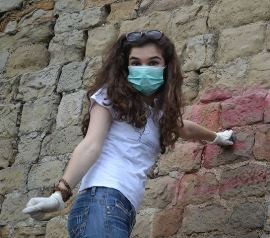
Oct. 2014—How do you help a struggling Serbian community confront high youth unemployment and social marginalization? By empowering the next generation to identify problems and advocate for change.
Civic Initiatives, a Serbian NGO, started the Empowered Youth for Positive Changes in South Serbia and Sandžak project with USAID support in 2013. Since then, 88 young Albanians, Roma, Bosniaks and Serbs have been trained within the YouthBuild program, one of the project’s three components. Besides the practical skills they acquired in developing projects, launching businesses, and mobilizing change within the community, the participants carried out a series of local actions to motivate fellow citizens and demonstrate that it doesn’t take much to accomplish big things.
Program participants gathered more than 2,000 people from southern Serbia and Sandžak to help refurbish kindergartens, schools and parks; remove graffiti; and take care of the environment. Public administration offices, companies and individuals donated more than $4,000, even though they, too, face economic hardships. Twenty program participants found employment or launched their own businesses as a result of the program.
The 15-month project had another equally important set of results—it helped break down troubling ethnic barriers between young people in this area. Before participating in this program, Aleksandar Milosevic, an ethnic Serb, and Enis Selimi, an ethnic Albanian, like most of their peers, would not have much to do with one another. This has changed.
“Thanks to the YouthBuild program, I have learned a lot about Serbian customs and realized that we can live with each other, instead of next to each other. My friendship with Aleksandar is unbreakable and I wish to exert influence on the young Albanians and Serbs so as to become friends and show mutual respect,” said Selimi.
And the program keeps growing. Seventeen young people have been trained to be the first generation of program instructors, four informal groups have been registered as civil society organizations, and YouthBuild established three new groups within this project, two of which have already received financial support from the Ministry of Youth and Sport.
"The young people who have participated in activities implemented by Civic Initiatives represent a great potential for development of Sandžak,” said Nihat Bisevac, director of the National Employment Service in Novi Pazar. “Not only have we encountered good potential workers and volunteers for all of our activities, but now we also know that there are young people who will independently initiate, find funds and implement activities for their own welfare and the welfare of their communities."
LINKS
Follow @USAIDSerbia, on Facebook, on YouTube







Comment
Make a general inquiry or suggest an improvement.